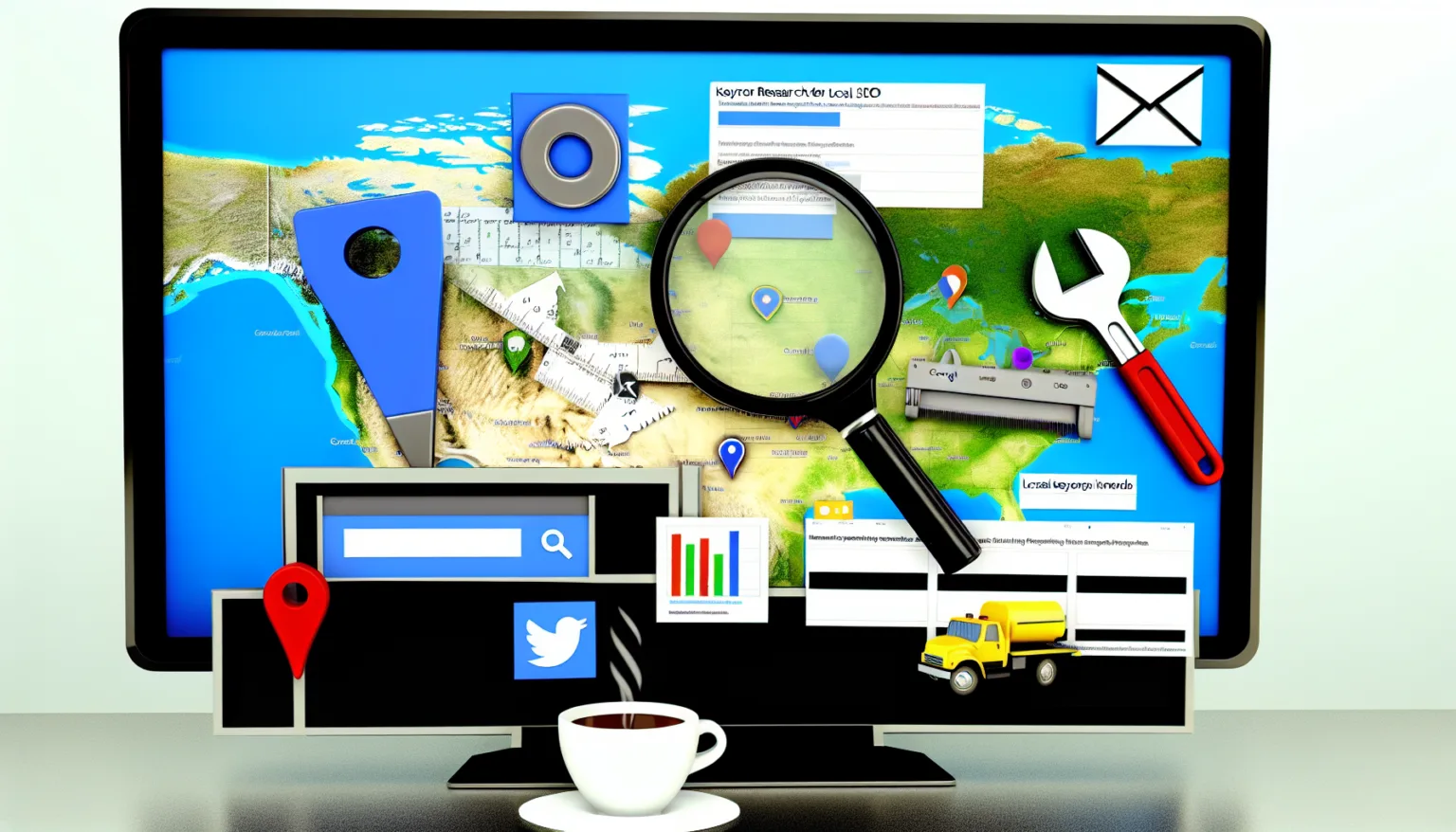Introduction to Local SEO
Local SEO is a cornerstone for any business aiming to gain prominence in its local market. This comprehensive guide includes essential strategies and practices to enhance online visibility. From understanding the intricacies of Google My Business and mastering local keyword research to the nuances of managing online reviews and leveraging local social media marketing, we cover it all. Advanced tactics, tools, and actionable insights await to empower your local SEO journey. Prepare to unlock the full potential of your business in the local digital landscape.
Understanding Google My Business (GMB)
What is Google My Business
Google My Business (GMB) is a crucial tool that helps business owners manage their online presence across Google, including Search and Maps. By verifying and editing your business information, you can help customers find you and tell them the story of your business. It is the foundation of local SEO, ensuring your business appears right when people search for your products or services online.
Setting Up Your GMB Listing
Step 1: Sign Up or Log In
Start by going to the Google My Business website and sign in with your Google account. If you don’t have one, you’ll need to create it.
Step 2: Enter Your Business Details
Enter your business name, address, and phone number (NAP). Ensuring that your NAP is consistent across all your online listings is critical.
Step 3: Verify Your Business
Google needs to verify that your business is legitimate. This can be done via postcard, phone, or email. Verification ensures that only you, the business owner or manager, has access to your listing.
Optimizing Your GMB Listing
Once your business is verified, optimizing your listing to stand out is essential.
- Add High-Quality Photos: Businesses with photos receive 42% more requests for directions on Google Maps and 35% more website click-throughs than businesses without photos.
- Gather Reviews: Encourage your satisfied customers to leave positive reviews. Respond to reviews to show you value customer feedback.
- Keep Your Information Updated: Regularly update your business hours, contact information, and services to ensure customers get accurate information.
Managing and Updating Your Profile
Keeping your GMB profile updated is crucial for customer engagement and SEO. Google gives preference to well-maintained, current profiles. Regular updates and posts about promotions, events, or news can keep your audience engaged and informed. Don’t forget consistency across your online presence aids in boosting your overall search rankings.
Understanding and leveraging Google My Business can dramatically improve your business’s visibility and engagement with local customers. It’s a powerful tool for any local marketing strategy, ensuring your business stands out in local search results.

Keyword Research for Local SEO
Finding Local Keywords
Keyword research for local SEO involves identifying your potential customers’ words and phrases when searching for your products or services in your area. The goal is for your business to appear in search results when local customers are looking for what you offer.
- Use Geo-Modifiers: Include location-based keywords, like the city or region your business operates in, to target local customers effectively.
- Focus on Service-Based Keywords: Combine your main services with local identifiers, such as “plumbing services Scottsdale” or “best coffee in Scottsdale.”
Tools and Techniques
Several tools can help you with local keyword research. Google’s Keyword Planner is a free option that allows you to filter keyword searches based on location. Other tools like SEMrush and Moz Local offer more advanced features and insights geared towards local SEO.
- Competitor Analysis: Look at the keywords your local competitors rank for. Identifying gaps and opportunities can refine your keyword strategy.
- Local Forums and Social Media: Pay attention to how locals talk about your industry online. This can reveal valuable, naturally-used keywords.
Incorporating Local Keywords into Your Website
Once you have a list of targeted local keywords, the next step is incorporating them into your website. Here are some best practices:
- Meta Titles and Descriptions: Include location-based keywords in your meta titles and descriptions to improve visibility in search results.
- Content: Use local keywords naturally in your website’s content, from the homepage to blog posts, to signal relevance to search engines.
- Local Landing Pages: If you serve multiple areas, consider creating dedicated landing pages for each location. Optimize these pages with local keywords and information specific to each area.
Effective keyword research and implementation are vital to a successful local SEO strategy. Understanding and targeting the right local keywords can improve your business’s online visibility and attract more customers from your community. Remember, the goal is to increase traffic and drive relevant, local traffic that converts.

On-Page SEO Strategies for Local Businesses
Optimizing Website Content and Structure
On-page SEO is essential for making your website more visible in the search results. This involves optimizing your website’s content and structure to make it more attractive to search engines for local searches.
- Mobile-Friendly Design: Ensure your website is responsive and provides a good user experience on mobile devices. Most local searches happen on mobile.
- Fast Loading Speed: Use tools like Google’s PageSpeed Insights to analyze and improve your website’s loading time. A fast-loading site is crucial for keeping potential customers engaged.
- Structured Data Markup: Implementing schema markup can help search engines better understand your content and enhance your listings in search results with rich snippets.
Importance of NAP Consistency
Consistency in your business’s name, address, and phone number (NAP) across your website and other online directories is fundamental. Inconsistent information can confuse search engines and potential customers, negatively impacting search rankings.
- Website Footer: Include your NAP in the footer of every page on your website to ensure it’s consistently available site-wide.
- Local Business Schema: Use LocalBusiness schema to mark up your NAP info, making it easier for search engines to identify and display your business details correctly.
Creating Local Landing Pages
Creating location-specific landing pages can significantly boost your local search visibility if you operate in different locations. Each page should provide unique content tailored to the local audience, not just duplicate content with different city names.
- Customize Content: For each location, include local landmarks, news, or events that resonate with the local audience.
- Local Testimonials: Showcase reviews and testimonials from customers in specific areas to build trust with prospective local customers.
- Google Maps Integration: Embed a Google Map with your business location on each local landing page to improve usability and search relevance.
Effective on-page SEO strategies consider the unique elements of local marketing. From optimizing your site’s mobile experience to ensuring NAP consistency and creating dedicated pages for each location, these methods can help your business stand out in local searches. For businesses looking to improve their local online presence further, exploring our website development services can provide additional tailored solutions.
Local Link Building
The Importance of Building Local Links
Link building is vital to any SEO strategy, including local SEO. For local businesses, acquiring links from other local websites helps boost search engine rankings by showing that your business is well-connected within the community.
- Boosts Local Search Rankings: Links from reputable sources can significantly improve your visibility in local search results.
- Drives Local Traffic: By establishing connections with local influencers and businesses, you will likely drive more relevant traffic to your site.
Techniques for Acquiring Local Backlinks
Building a strong local backlink profile involves several strategies, focusing on partnerships and contributions to the local community.
- Partner with Local Businesses: Partner with local businesses to share links and promotions. This could be as simple as a mutual recommendation on each other’s websites.
- Local Directories: Ensure your business is listed in local directories, such as the Chamber of Commerce or local business associations. These listings can provide valuable links back to your site.
- Host or Sponsor Local Events: Events are a great way to build links, as local media and participating businesses might link to your website when talking about the event.
Leveraging Local Community Engagement for Link Building
Engaging with your local community is another effective way to build links. This could involve participating in local forums, contributing to local blogs, or engaging in community service projects. Each activity helps build your local reputation and increases the chances of acquiring backlinks from various local sources.
- Contribute to Local Blogs: Guest blogging on local websites can help you showcase your expertise and gain backlinks.
- Engage in Social Media: Use social media to engage with local customers and businesses. Participating in local conversations can lead to more backlink opportunities.
Local link building is a crucial aspect of enhancing your local SEO efforts. By establishing connections within the community and emphasizing local partnerships, your business can improve its local search visibility and credibility. Remember, local link building aims to increase your search rankings and become a recognized part of your local community.

Managing Online Reviews and Ratings
The Impact of Reviews and Ratings on Local SEO
Reviews and ratings are critical components of local SEO. They provide social proof for your business, influencing customer decisions and search engine rankings. Positive reviews can significantly enhance your business’s visibility and credibility.
- Boost Search Rankings: Search engines like Google consider reviews and ratings important factors when determining local search rankings.
- Increase Click-Through Rates: Listings with higher ratings are more likely to get clicked on, driving more traffic to your website.
Encouraging Customers to Leave Positive Reviews
Actively encouraging satisfied customers to leave positive reviews is essential for any local business. Here are some effective ways to do so:
- Ask at the Right Moment: Request reviews when customers are most satisfied, such as after making a purchase or receiving exceptional service.
- Make It Easy: Provide direct links to your review profiles on Google, Yelp, and other relevant platforms. The easier it is to leave a review, the more likely customers will do it.
- Respond to Reviews: Acknowledge and thank customers for their reviews. This engagement can motivate others to leave their feedback as well.
Best Practices for Responding to Reviews
Responding to positive and negative reviews is crucial for maintaining a positive online reputation. Here’s how best to handle them:
- Positive Reviews: Express your gratitude and highlight specific aspects the customer enjoyed. Personalized responses make customers feel valued.
- Negative Reviews: Address the issue raised calmly and professionally. If necessary, offer to resolve it offline, showing potential customers that you take their concerns seriously.
Effectively managing online reviews and ratings is a cornerstone of a successful local SEO strategy. Positive feedback improves your search engine rankings and builds trust with potential customers. Remember, every positive or negative review is an opportunity to enhance your business’s reputation and visibility in the local market.

Leveraging Local Social Media Marketing
The Role of Social Media in Local SEO
Social media impacts local SEO by driving engagement and local visibility for businesses. Platforms like Facebook, Instagram, and Twitter can be powerful tools for connecting with the local community, promoting local events, and showcasing products or services.
- Increases Brand Awareness: Regularly posting engaging content can keep your business top-of-mind for local consumers.
- Drives Traffic to Your Website: Share links to your website content, such as blog posts or product pages, to drive traffic.
Tips for Using Social Media to Enhance Local Visibility
Maximizing the impact of social media on your local SEO efforts involves strategic planning and engagement.
- Use Local Hashtags: Incorporate local hashtags into your posts to increase their visibility in local search results on social platforms.
- Engage with Local Community: Follow and engage with local businesses, influencers, and community groups to build relationships and increase your visibility.
- Promote Local Events: Use your social media platforms to promote any events you host or participate in within the community.
Examples of Effective Local Social Media Campaigns
Successful local social media campaigns often involve creative engagement strategies that resonate with the local audience. Here are a couple of examples:
- User-Generated Content: Encourage customers to share their experiences with your product or service, offering a local hashtag for people to use.
- Local Influencer Partnerships: Partner with local influencers to reach a broader audience. Influencers can share their genuine experiences with your brand, lending credibility and local relevance.
Leveraging social media for local marketing is about more than just posting content; it’s about meaningfully engaging with the local community. By strategically using social media, businesses can enhance their local SEO, increase their visibility in the community, and attract more local customers. Remember, social media marketing is an ongoing process that requires consistency and creativity to maintain engagement and interest from your local audience.

Advanced Local SEO Tactics and Tools
Overview of Advanced Strategies
Once you have the basics of local SEO, consider adopting advanced strategies to boost your visibility further. These tactics can help you stay ahead in a competitive local market.
- Schema Markup: Implementing Schema markup for local businesses helps search engines understand your site’s content better, enhancing your visibility in local search results.
- Google Posts within GMB: Use Google Posts in your GMB profile to promote events, offer updates, and showcase products. This content appears directly in search and maps results, giving you a direct line to potential customers.
Essential Local SEO Tools
Several tools can streamline your local SEO efforts, providing insights and efficiency. Here are some key tools to consider:
- Moz Local: This tool helps manage your business listings across the web, ensuring consistency and increasing visibility.
- BrightLocal: BrightLocal offers SEO tools designed specifically for local businesses, including audit reports and local ranking trackers.
- SEMrush: While SEMrush is known for its broad SEO capabilities, it also offers features tailored to local SEO, such as location-specific keyword tracking.
Staying Ahead with Future Trends
The landscape of local SEO is continuously evolving. Stay informed about the latest trends and updates to keep your strategy fresh and effective. Voice search optimization, for instance, is becoming increasingly important as more people use voice assistants for local queries.
- Optimize for Voice Search: Focus on conversational keywords and FAQs on your site to match the natural language used in voice searches.
- Localize Your Content Strategy: Creating content that speaks directly to your local audience can significantly increase engagement and relevance.
Adopting advanced local SEO tactics and utilizing the right tools can significantly enhance your search presence and drive more targeted traffic to your site. By staying ahead of the curve with new strategies and trends, you can ensure your business remains visible and attractive to your local audience. For businesses looking to leverage these advanced tactics effectively, our SEO services offer customized solutions tailored to your needs.

FAQs
In this section, we address some frequently asked questions about local SEO that can help clarify common concerns and strategies for businesses seeking to enhance their local search presence.
Why is Local SEO Important for Businesses?
Local SEO helps businesses become more visible in search engine results for searches with local intent. This means when potential customers search for products or services “near me”, your business can appear as a leading option, driving more foot traffic and online inquiries.
How Often Should I Update My GMB Listing?
Keep your Google My Business listing up to date with any changes in your operating hours, services, or contact information. Regularly adding new photos and posts can also keep your listing engaging for users.
Can Social Media Impact My Local SEO?
Social media influences local SEO by driving engagement and potentially affecting your business’s visibility in local searches. Engaging with customers and sharing content relevant to your local area can enhance your local search presence.
How Can I Monitor My Local SEO Performance?
Use tools like Google My Business Insights, Google Analytics, and specialized local SEO tools to track your business’s performance in local search results. Monitor metrics like website visits, call clicks, and direction requests from your GMB listing.
What’s the Best Way to Respond to Negative Reviews?
Respond to negative reviews professionally and courteously. If possible, offer to address the issue offline and show prospective customers that you value feedback and strive to improve.
How Does Voice Search Affect Local SEO?
Voice search is growing, with more people using voice assistants for local queries. Optimize your content for conversational keywords and phrases that people might use when speaking rather than typing.
Addressing these frequently asked questions can help demystify aspects of local SEO and guide businesses to implement effective strategies better. Our SEO services can provide tailored support and expertise for those seeking professional assistance to boost your local search rankings and visibility.

Conclusion
Mastering local SEO is key to unlocking your business’s full potential in its local market. From setting up an optimized Google My Business listing to engaging in local link building and managing online reviews, the steps outlined in this guide provide a roadmap to enhance your online visibility and draw more customers to your business. Remember, consistency and engagement are vital. Stay proactive, embrace local community interactions, and update your listings and content. Ready to elevate your local SEO strategies? Dive in, apply these insights, and watch your local business flourish.
